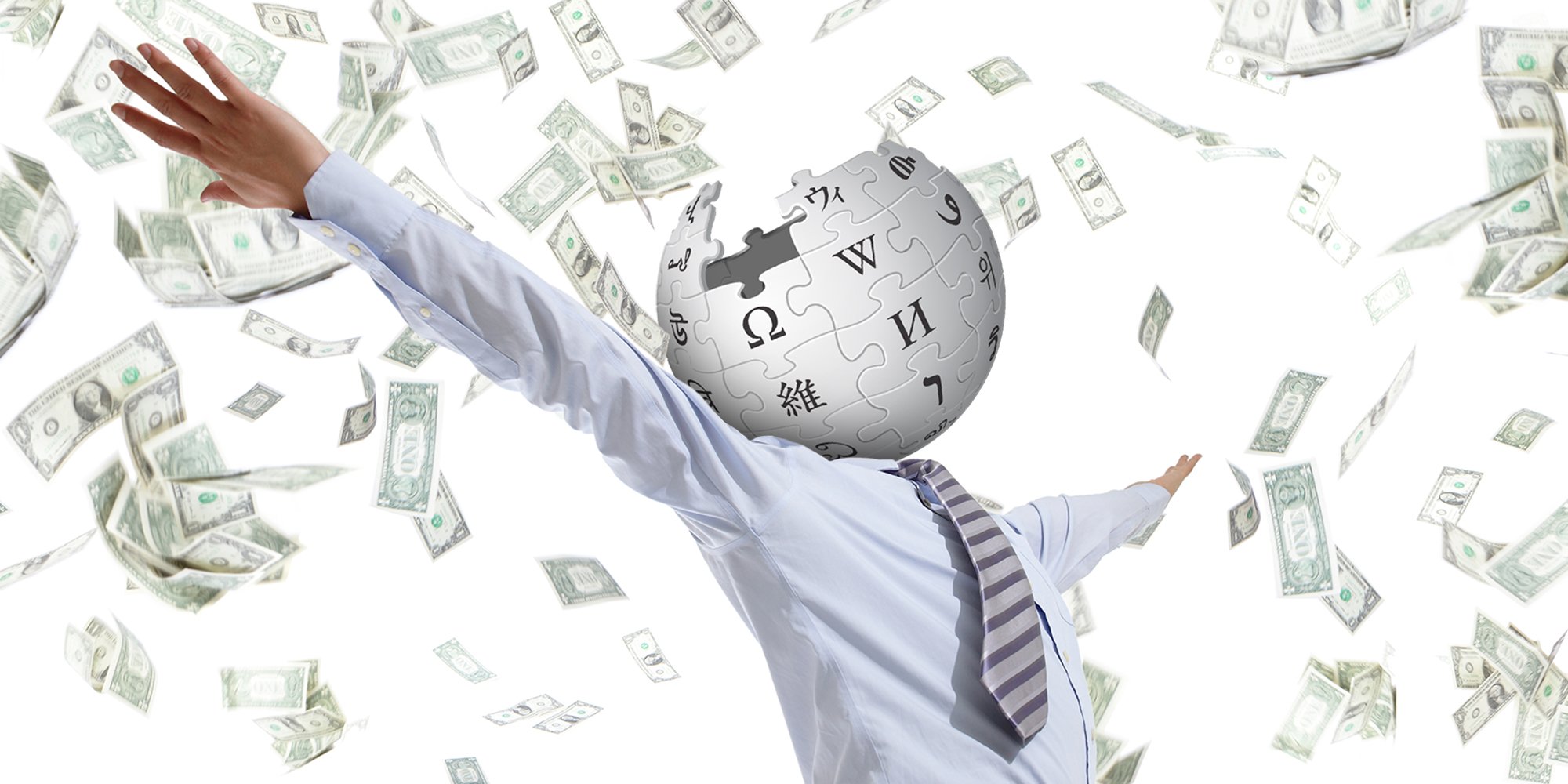
The nonprofit Wikimedia Foundation (WMF), which owns Wikipedia and other UGC sites, is about to reach its ten-year goal of raising $ 100 million in long-term reserve for Wikimedia Endowment. This will happen five years earlier than planned . The volume of net assets (net assets) is about $ 200 million as of June last year. Now it is about $ 300 million. Revenues are constantly growing. According to internal documents , in the first nine months of this fiscal year, the fund raised $ 142 million in donations - and has already broken last year's record.
This information may surprise donors and users around the world who have seen Wikipedia fundraising banners. They are shown at different times in different countries. Last year, they started playing for the first time in India. These banners are currently being shown to residents of pandemic-ridden Latin America. They give the impression that WMF is working hard to keep Wikipedia up and running ... The messages are plaintive: “This Thursday, Wikipedia really needs you. This is the tenth appeal that we have shown you. 98% of our readers do not donate, they turn away ... We ask you, please, do not scroll away from us "(We ask you, humbly, don't scroll away)".
According to a rough estimate of Eric Moeller, vice president of development for WMF, $ 10 million would be enough to support Wikipedia in 2013. What does WMF do with the rest of the amount? The funds go to salaries for hundreds of employees and a reserve for a rainy day. The foundation has ambitious plans to become a “free knowledge ecosystem infrastructure”. Therefore, he tells the readers of Wikipedia that their money is really needed. Although the organization is now richer than it has ever been in its history.
In 2016, WMF announcedon the creation of a reserve fund for Wikimedia Endowment in cooperation with the Tides Foundation. It was on the 15th anniversary of Wikipedia. The goal is to accumulate $ 100 million over ten years as "a constant source of funding for the prosperity of Wikipedia in future generations."
In just five years, the fund has raised more than $ 90 million , and will reach its "initial target" of $ 100 million this year, thanks to massive donations from Amazon, Google, Facebook and other companies, along with traditional donations, as well as $ 25 million from WMF itself.
It is noteworthy that donations to the reserve fund are not included in the reportingby net assets of WMF ($ 180 million as of June 2020) or annual income ($ 130 million). However, the money that WMF transfers to this fund is shown in the expense item ("Awards and grants"). These two facts hide the fact that WMF has been operating de facto with much larger surpluses over the past five years than indicated in the financial statements . The reports show an increase in net assets over this period of "only" $ 100 million. In fact, the total amount of WMF funds has doubled.
Wikimedia Endowment isn't the only money Wikimedia is channeling to the Tides Foundation. Last year, when WMF literally didn’t know how to handle the huge amount of financial revenues, and public events were canceled due to the pandemic, it donated an additional $ 8.7 million to the new Tides Advocacy fund.
In addition, WMF opens a commercial firm called Wikimedia, LLC. It will sell API services to big tech companies, making it easier for them to process Wikimedia content, including content for voice assistants such as Apple's Siri and Amazon's Alexa, as well as infoboxes in Google search results. All of these smart IoT devices are now using content from Wikipedia to create a “know-it-all” impression.
The Wikimedia LLC project worries many volunteer editors of Wikipedia. They view profits as potentially corrupting influences. And there is a clear inequality in that WMF staff members are paid while volunteers work for free. Wikipedia is composed of approximately three billion individual edits. Average revisions currently generate WMF about 4.3 cents in annual revenue, and much more revenue for large tech companies. Wikipedians with hundreds of thousands of edits may feel like someone else is enjoying the fruits of their labor.
The immense wealth of WMF hasn't made much of an impact on the way Wikipedia looks to the reader. A traveler from 2007, when Wikipedia entered the top 10 sites on the Internet, won't notice much of a difference. But WMF itself has changed beyond recognition. In 2007, the organization had 11 employees, and expenses amounted to $ 2 million.
Fast forward to 2021. In April, CEO Katherine Maher left WMF, so the fund posted a vacancy . It lists the number of WMF employees over 500 people. Top managers earn from $ 300,000 to $ 400,000 per year... More than 40 people are engaged exclusively in fundraising. Modern banners count the number of impressions per person ("Hi Canadian reader, it looks like you use Wikipedia a lot; that's great! We are embarrassed, but this Tuesday we need your help. This is the tenth appeal we showed you ...") and plead : “Please don't scroll away” - the phrase has shown surprisingly high efficiency in A / B testing. In December last year, readers who turned down the banner were shown a weeping emoticon .

WMF has emphasized over and over again that Wikipedia does not sell anything. But own fundraising ads are describedlike banners saying "We will never show ads."
This is an important aspect of WMF PR. A few days before leaving WMF, Catherine Maher appeared on the Trevor Noah daily show (the wife of WMF PR consultant Craig Minassian of the Clinton Foundation is the show's producer).
In an interview, Noah asked about the problems of the non-profit organization: is there really not enough money to keep Wikipedia working. And why do something that doesn't make money.
In her brisk response, Maher made no mention of WMF's huge cash reserves. But she emphasized that the lack of advertising is the reason why Wikipedia is so trusted, see the video from the 4:30 mark :
This video is published on YouTube, complete with a donation button: Help Wikipedia Stay Free, Independent & Online. (the button is not available in all countries - approx. per.).
Last summer, WMF reported new financial records, and immediately thereafter launched a fundraising campaign in India for the first time in history, inviting readers to donate 150 rupees (two dollars) each. Banners that read “Wikipedia really needs you”, “We need you to make a donation to protect Wikipedia's independence”, “Help keep Wikipedia online” have raised concerns in India that Wikipedia is dying or might switch to a paid subscription.
Wikipedians have long expressed outrage at these fundraising banners . Wikipedia should be the "Free Encyclopedia" and not make readers feel guilty. Wikipedia never risked losing its servers or its independence, never needed to display ads. Each year WMF raised more than the previous year and expanded its staff.
Black : Net assets (excluding Wikimedia Endowment reserve, currently $ 90 + million)
Green : Income (excluding third party donations to Wikimedia Endowment reserve)
Red : Expenditures (including payments to Wikimedia Endowment)
This year was no different. For the first three quarters, the annual targetWMF and Wikimedia Endowment have been exceeded for the current fiscal year. It had to be increased from $ 108 million to $ 125 million. But this goal was also exceeded by $ 17 million by the end of March . However, a few weeks later, WMF began raising funds in pandemic-torn South America. Readers are asked to “humbly” donate money to “ protect the independence of Wikipedia ” and “show volunteer editors that their work matters” (some of the volunteers are not at all happy about this ).
WMF's financial independence is clearly safe. So what's going on? Official WMF Response : There is never too much money for a rainy day. In addition, WMF has ambitious plans to “become the global infrastructure for the ecosystem of free knowledge” by 2030. The organization wants to create a "knowledge equity" in which people have the same access to information in their native language as first-world citizens in their own language. Therefore, a constant increase in the budget is required. For these purposes, the money tap from Wikipedia is intended, which can be opened at any time.
In the midst of a pandemic, residents of Argentina and Uruguayfear for their lives and livelihoods, and WMF tearfully asks for donations for the independence of Wikipedia.
Perhaps people are better off not seeing these calls.